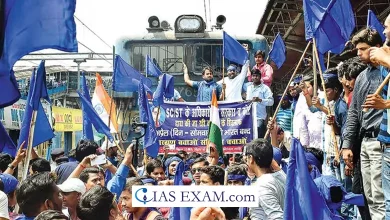UPSC Editorial Analysis
Sedition Law in India
[GS Paper 2 – Indian Constitution, Fundamental Rights, Judiciary]
Context – The Supreme Court suspended pending criminal trials and court proceedings under Section 124A (sedition) of the Indian Penal Code, while allowing the Union of India to reconsider the British-era law.
The SC has recently stated that, all pending trials, appeals and proceedings with respect to the charge framed under Section 124A of the IPC be kept in temporary suspension. The court also restrained centre and states from registering FIRs, continuing investigations or taking coercive measures under Section 124A.
About Sedition Law
- Section 124A of the Indian Penal Code lays down the punishment for sedition. The IPC was enacted in 1860, under the British Raj.
- The then British government in India feared that religious preachers on the Indian subcontinent would wage a war against the government.
- Particularly after the successful suppression of the Wahhabi/Waliullah Movement by the British, the need was felt for such a law.
- Throughout the Raj, this section was used to suppress activists in favor of national independence, including Tilak and Mahatma Gandhi, both of whom were found guilty and imprisoned.
Definition of Sedition
- The Section 124A defines sedition as- An offense committed when “any person by words, either spoken or written, or by signs, or by visible representation, or otherwise, brings or attempts to bring into hatred or contempt, or excites or attempts to excite disaffection towards the government established by law in India”.
- Disaffection includes disloyalty and all feelings of enmity. However, comments without exciting or attempting to excite hatred, contempt or disaffection, will not constitute an offense.
- Sedition is a non-bailable offense. Punishment under Section 124A ranges from imprisonment up to three years to a life term with/without a fine.
- Sedition was made a cognizable offense for the first time in history in India during the tenure of Prime Minister Indira Gandhi in 1973, that is, arrest without a warrant was now permissible.
- In 1962 the Supreme Court of India interpreted the section to apply only if there is, say, “incitement to violence” or “overthrowing a democratically elected government through violent means”.
Constitutional Validity
- Violative of FRs – Two high courts had found it unconstitutional after Independence, as it violated the freedom of speech and expression.
- Reasonable restrictions – The Constitution was amended to include ‘public order’ as one of the ‘reasonable restrictions’ on which free speech could be abridged by law.
- Kedar Nath Case – Thereafter, the Supreme Court, in Kedar Nath Singh v. The State of Bihar (1962) upheld its validity.
- Limited use – At the same time, it limited its application to acts that involve “intention or tendency to create disorder” or incitement to violence.
- Strong criticism doesn’t amount to sedition – Thus, even strongly worded remarks, as long as they do not excite disloyalty and enmity, or incite violence, are not an offence under this section.
Importance of Sedition Law
- The law keeps a check on anti-national, secessionist and terrorist elements that can hamper the public order and incite violence and induce enmity.
- It helps in the stability of the elected government which could otherwise be attempted to be thrown out using illegal and violent means.
- It is an alignment with contempt of court. Elected Government is an important part of the executive. Hence, contempt of the government can be checked.
Arguments Against the Sedition Law
- As the seeds of sedition law were sown in colonial times, it is often described as a draconian law that can be used against what is otherwise is constitutionally guaranteed freedom of speech and expression
- It has an ill effect on constructive criticism. As noted by the Supreme Court, views that are different from the government’s don’t mean seditious. Therefore, sedition laws can demotivate legal and lawful criticism.
- Britain had repealed the Sedition Act in 2009, hence India should too be long done with this.
- To penalize the offender for disrupting public order, IPC and Unlawful Activities Prevention Act 2019 have provisions that can take care of the punishments.
- India’s ratification of the International Covenant on Civil and Political Rights (ICCPR) in 1979 should be seen as a right step towards acknowledging freedom of expression. Hence, with Sedition Law in activity, could lead to the wrong use of the law where people are charged with offence arbitrability for expressing their opinions.
Way forward
- India is the largest democracy in the world and the right to free speech and expression is an essential ingredient of democracy.
- The sedition law should not be abolished as some measures are needed to check communal violence & insurgency activities like Naxals.
- The definition of sedition should be narrowed down, to include only the issues pertaining to the territorial integrity of India as well as the sovereignty of the country.
- Section 124A should not be misused as a tool to curb free speech.





.png)



